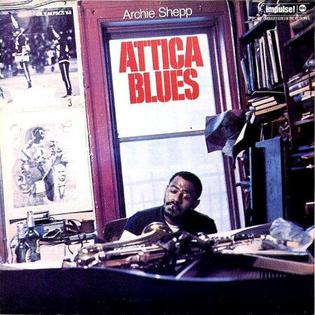Archie Shepp Attica Blues(jazz)(mp3@320)[rogercc][h33t]seeders: 6
leechers: 0
Archie Shepp Attica Blues(jazz)(mp3@320)[rogercc][h33t] (Size: 85.62 MB)
Description
Archie Shepp Attica Blues
Released : 1972 Label : Impulse Format : Mp3@320  Attica Blues by avant-garde jazz saxophonist Archie Shepp. Originally released in 1972 on the Impulse! label, the album title is a direct reference to the Attica Prison riots. The Attica Prison riot occurred at the Attica Correctional Facility in Attica, New York, United States in 1971. The riot was based in part upon prisoners' demands for better living conditions. On September 9, 1971, responding, in part, to the death of prisoner George Jackson, a black radical activist prisoner who had been shot to death by corrections officers in California's San Quentin Prison on August 21, about 1,000 of the Attica prison's approximately 2,200 inmates rebelled and seized control of the prison, taking 33 staff hostage. During the following four days of negotiations, authorities agreed to 28 of the prisoners' demands, but would not agree to demands for complete amnesty from criminal prosecution for the prison takeover or for the removal of Attica's superintendent. On the order of Governor Nelson Rockefeller, state police took back control of the prison. When the uprising was over, at least 39 people were dead, including ten correctional officers and civilian employees. Allmusic Review: Refining his large-ensemble experiments of 1971, Attica Blues is one of Archie Shepp's most significant post-'60s statements, recorded just several months after authorities ended the Attica prison uprising by massacring 43 inmates and hostages. Perhaps because Shepp's musical interests were changing, Attica Blues isn't the all-out blast of rage one might expect; instead, it's a richly arranged album of mournful, quietly agonized blues and Ellingtonian swing, mixed with a couple of storming funk burners. Of course, Shepp doesn't quite play it straight, bringing his avant-garde sensibilities to both vintage big band and contemporary funk, with little regard for the boundaries separating them all. His soloing on tenor and soprano is typically sharp-edged and modal, and his nasal, slicing tone on soprano is featured quite heavily. The stylishness of the slow numbers is undercut with quivering, faintly unsettling dissonances, and the up-tempo funk cuts recall the way Sly Stone's arrangements ping-ponged many different elements off each other in a gleeful organized chaos. That's especially true on the gospel-inflected title song, a monster of a groove that later became a hit on the acid jazz revival circuit (and stands up to anything recorded by straight-up funk bands of the era). In the same vein, "Blues for Brother George Jackson" sounds like an edgier Isaac Hayes-style blaxploitation soundtrack cut. Vocal ballads are plentiful, and Joe Lee Wilson ("Steam," a song Shepp would return to often) and Carl Hall (aka Henry Hull) both acquit themselves well; more debatable are the poetic recitations and the choice of flügelhornist/composer Cal Massey's young daughter Waheeda to sing "Quiet Dawn" (although Waheeda's almost-there intonation is effectively creepy). Still, in the end, Attica Blues is one of Shepp's most successful large-group projects, because his skillful handling of so many different styles of black music produces such tremendously groovy results. Tracklist : 1."Attica Blues - 5:06 (including invocation by Beaver Harris) 2."Steam (Part 1)" - 5:07 3."Invocation To Mr. Parker" - 3:16 4."Steam (Part 2)" - 5:10 5."Blues For Brother George Jackson" - 4:24 6."Ballad For A Child" - 3:41 (including invocation by Beaver Harris) 7."Good-Bye Sweet Pops" - 4:22 8."Quiet Dawn" - 6:12 Recorded at A&R Studios, NYC, January 24–26, 1972  Personnel Archie Shepp: tenor and soprano saxophones Clifford Thornton: cornet Roy Burrows, Charles McGhee, Michael Ridley: trumpet Cal Massey: fluegelhorn Charles Greenlee, Charles Stephens, Kiane Zawadi: trombone Hakim Jami: euphonium Clarence White: alto saxophone Marion Brown: alto saxophone, flute, bamboo flute, percussion Roland Alexander, Billy Robinson: tenor saxophone James Ware: baritone saxophone John Blake, Leroy Jenkins, Lakshinarayana Shankar: violin Ronald Lipscomb, Calo Scott: cello Dave Burrell: electric piano Walter Davis, Jr.: electric piano, piano Cornell Dupree: guitar Jimmy Garrison, Gerald Jemmott, Roland Wilson: bass Ollie Anderson, Nene DeFense, Juma Sultan: percussion Beaver Harris, Billy Higgins: drums Joshie Armstead, Henry Hull, Waheeda Massey, Albertine Robertson, Joe Lee Wilson: vocal Bartholomew Gray, William Kunstler: narrator RoMas: arranger Romulus Franceschini: conductor Related Torrents
Sharing Widget |